Let’s start with this month’s special, starting with an interview with our guest David Farmer. David and I discuss general aspects of his career, his thoughts, techniques, and more! Hope you enjoy it as I much as I did.
Designing Sound: How did you get started in sound and how has it evolved into a career?
David Farmer: I’m not ashamed to tell you that I started as a copycat, or maybe wishful copycat is a better way to say it. I was pretty much obsessed with the character of the sounds in films by Ben Burtt & Gary Rydstrom (ask anyone that worked with me back then!). I’ve seen “The Empire Strikes Back”, and “Raiders of the Lost Ark” more times than most would dare to admit. My career in sound also started right after T2 came out, and I was mesmerized by the nature of Rydstrom’s work as well. So I added T2 & Backdraft to my rotation of “watch all the time” films. When I started, I was on the night shift and my 2 roommates worked during the day. So I had all day to watch & listen to whatever I liked.
I’d do things like watch the movie with the sound off, and also listen with the picture off. I know that sounds dorky, but it was a great way to train the brain & ears. As time went by & I cut my teeth in sound, I honestly did approach almost everything I was working on with Ben & Gary’s work in the back of my mind. Try as I might though, I could never sound quite like them. I eventually made peace with it, and learned to be OK with sounding like me. It actually turned out to be a huge relief when I stopped trying to sound like someone else. (Their work is still my favorite though! :) It’s a lot like being a musician in that respect. You can take a guitar player & put them on 10 different amps & guitars, but there’s something about them that stays consistent regardless of the gear.
DS: What was your first gig like?
DF: The first sound effect I ever put in a track was a car door close on a TV show called “Dark Justice”. I wasn’t the editor on the show but I was sitting in on the mix (I guess I was still interning) and they wanted a different effect. I was sooooo excited about it! Just thinking that I had put in an actual sound effect that would be heard by dozens of people! ;) So OK, that wasn’t my first “gig” but I do remember that moment – it made quite an impression on me. I’m trying to remember what the first gig was, and I’m not actually sure. I know the first tidbit of responsibility I had was to prepare temp effects to give picture departments for shows we had coming in. We’d get wish lists of things and I’d put them together using the Synclavier, put them on DAT tape, and send them off to the picture editors.
It was my first exposure to interpreting what clients say they want. I’d see something on the list like “small electrical explosion”, and so I’d prep just exactly that, a SMALL electrical explosion! I had to run everything past Harry Cohen who was the head of the effects department. This was to make sure we weren’t sending out crap, and it’s a good thing he listened first! I was too literal, and he had to explain to me that a “small electrical explosion” really was about the size of a transformer landing on a car and the entire thing bursting into flames. This was all done without any picture to reference, or maybe it would have been clearer. However learning to make things larger than they appear is a challenge everyone I’ve ever known has had to work on.
DS: Who was your mentor early on? What influenced your learning the most during that time?
DF: Harry Cohen was awesome! It was a bit by chance that I hooked up with Harry. I was looking for a place to intern that had Synclaviers, and EFX Systems in Burbank had more Synclaviers than anyone else. I was really happy to land there because of the Synclaviers, but I was unaware that the best thing there for me was Harry. The management were trying to steer me towards dialog since they needed dialog editors. But I knew that if I was going to pigeon-holed somewhere, it was going to be SFX because I wasn’t interested in dialog!
So Harry is one of these rare talents that is also really happy to share his knowledge. And he likes to talk about the craft too, so all I had to do was be present & listen. I can’t work and talk to other people at the same time, in fact I almost require solitude so I can focus and try to think. I never did well with interns sitting in with me. I wish I could pass on some of what I’ve learned like that, but I just can’t work that way. But Harry could! We’d talk all day as he was working, and I learned a lot from him. I was also single and insanely gung-ho, so when the day ended for the day shift, I’d hang around for several more hours & practice.
I was really lucky that I was there at EFX. We weren’t doing huge-budget films. There were a lot of lower budget films & TV moving through there. When I first started I was on the night shift doing backgrounds for just about every TV show & film moving through there. When time permitted & schedules required, I started doing more hard FX. The great thing for me was, since i was the BG guy & bouncing between all the shows, when films came up that needed help, I was actually the first one free to work on them since the more experienced people were tied up with their TV shows. I’d stay all night usually. I was supposed to leave around 3AM I think, but I usually stayed until the next shift came in and kicked me out. I didn’t bill for those extra hour. They were used to practice my chops. It was a dream come true really. I had the time, and the interest, and there I could squeeze out tons of extra experience, doing it on real shows. Also, seeing that most of these things were pretty low budget, I felt a certain freedom to stretch the limit & see what I could get away with sound-wise. I’d use strange elements, mix & match things that you normally wouldn’t do, and see if it flew.
The atmosphere there at EFX was just great. As I was bouncing around from show to show I was also working with several great SFX editor/designers like Ann Scibelli, Tim Gedemer, Paul Menichini, and Ricardo Broadus. There were many discussions about sound & film, and everyone shared info & sounds freely. It really felt like one team working together to get all the shows done.
DS: What do you love about being a sound designer?
DF: I think it’s that sound is so intangible. It also makes it very hard to describe in words, what you want something to sound like, unless you refer to another sound directly. I also love when I can use a sound for something other than what it is and get away with it. I remember using a wet car by for a flare gun shot in “The Island of Dr. Moreau”, and noone could tell thats what it was. I love stuff like that.
DS: Do you have any special methods or moments that affect you the most creatively?
DF: I don’t have a good answer for that. It’s really tough. I feel like my butt is in the sling pretty much all the time. I don’t get many calls for the simple solutions. But honestly, staying challenged is the only way to keep from stagnating so I welcome it.
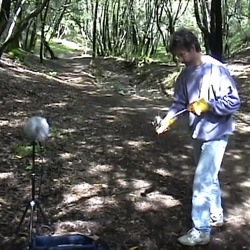
DS: When you’re working on a sound and it simply isn’t working out, what do you do? How you deal with those challenging moments?
DF: Sometime I just step away for a while, and an idea pops up. Sometimes not. Quite often, I reach that point after I’ve been working with a certain set of base elements, and in trying to get it to work, have just piled on a lot of other things. If I get that far and its turning to mush, or missing the right flavor, its usually because the base is wrong. In those cases its best to broom it and start over with entirely different sources. When it’s possible, I try to record something new. There’s nothing like a fresh piece of sound that I’ve never used before! This isn’t always possible though. Take for instance a dragon vocal. There’s not much I haven’t recorded for that type of sound. Certainly there’s nothing convenient to record, or I would have done it already! So in a case like that, sometimes what I’ll try is to make a pass through just as fast as I can and see if a simpler approach generates a solution. Sometimes spending too much time on something just works against you.
DS: Honestly, when I think about creature sounds, I think David Farmer. Is there a draw for you to this type of work? How do you first approach this kind of vocal sound design?
DF: I’m flattered! When I think of creature sounds I think of Ben Burtt or Gary Rydstrom. They’ve still delivered the most unique & identifiable creatures to date IMO. Who wouldn’t recognize Chewbacca or the T-Rex?
I went to great lengths to make the creatures in Lord of the Rings iconic, and the films production value required it to hold up. It was certainly because of Rings that I get so many jobs for creatures the last decade. But in all honesty, I hadn’t done extensive creatures before that. I had done some, but nothing to that degree, with that much diversity, and certainly none that demanded that much integrity. The exciting thing about it was the discovery of that craft, that process, and perhaps most of all hunting down the source. I had not done a lot of animal recording before that, so it was exhilarating to go record my own tigers, lions, leopards, seals, elephants, horses, and on & on & on. I went to Arkansas for elephants, and Oregon for something as simple as a donkey! I paid for all my animal recording out-of-pocket, so I could retain the rights to the source. It was quite exciting to see & hear these things come to life, to give them that voice, and to have brought it to that stage from microphone to screen.
Creatures are satisfying because the source is fairly elusive, and unpredictable. They are also incredibly difficult to make iconic, because there are only so many animals to record. And growls do not an iconic sound make. That center projecting bellow is really hard to find, and is really the only part of the sound that has the chance to make something a signature.
DS: What are your favorite tools to work with? Are there any special or “unusual” tools you like to use?
DF: I use Pro Tools just like most everyone else these days. I really miss the Synclavier. There was something very special about that tool that made design more performance based. It was a sampler that had a dedicated keyboard, and internal sequencer with a hardware button panel that just made it a spectacular tool. There was something about using it that aided creativity in a very tactile way.
Pro Tools is a great system that can do a lot different things than the Synclavier ever could. But Pro Tools is not performance based. We nudge regions around & can do very minute detailed editing, which was tougher on the Synclavier. I thought by now we’d have some answer to the Synclavier, but no sampler has the same intuitive interface. And add into that the MIDI sequence issues to layer sounds, and its just more trouble than it’s worth usually. I’ve tried to create workflows with Kontakt, Mach5, and Structure, but nothing comes close to that tactile interaction the Synclavier had. I know they’ve continued work on the Synclavier, and I’m not up-to-date on where it currently stands. If it can operate with my existing file library then I’d definitely look into one.
I’ll cover the tools I use more in depth in a later article.
DS: What are your favorite sounds to record or design?
DF: The more diverse the better for designing, if I can find somewhere really creative to go, I’m happy . I do prefer making sequences (film style) to individual sounds, though both have their own sets of gratifying challenges. I suppose fantasy based sounds would be my #1 though, espcially “Ring’s” fantasy. They just interested me the most and required a real gritty, dirty sound.
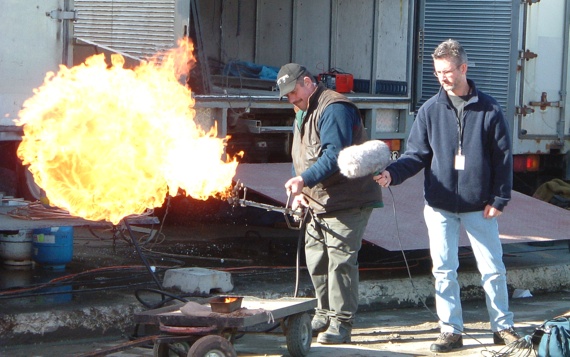 DS: Finally… We’ve heard your music work. How does this relate to sound design and why do you like to create music?
DS: Finally… We’ve heard your music work. How does this relate to sound design and why do you like to create music?
DF: Well I’ve been toying around with music since I was a teenager, but I never pursued a career in it. I’ve always sketched out songs and they’re always popping into my head. There’s nothing unique there as lots of my peers are doing the same thing. Most of them are much better musicians than me as well. About 5 years or so ago, it dawned on me that I had a setup that most project musicians would be frothing at the mouth over. And all these things I acquired to make things go boom. ;)
So my musical projects are for a handful of reasons.
– It’s an excellent diversion from the other sounds I make all day.
– It’s like going back to my early days in Sound Design – I’m trying to see what I can get away with.
– Unlike all the other Sound Design – I don’t have to get anyone else’s approval on the final result. (This might be reason #1 ;)
– It’s a fun way to study sound & how to work with it.
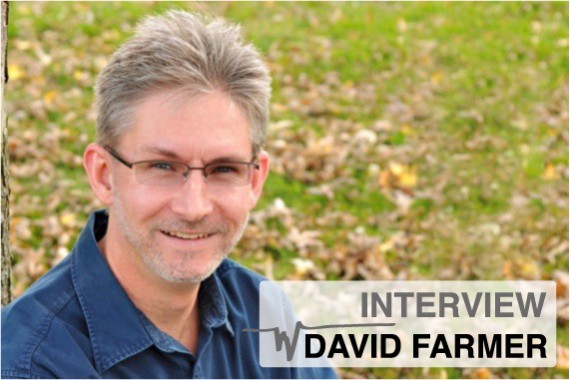
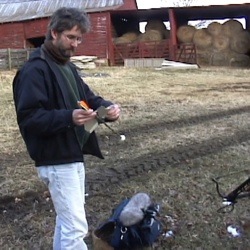
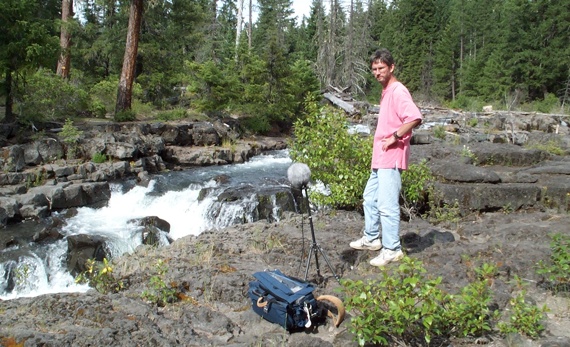
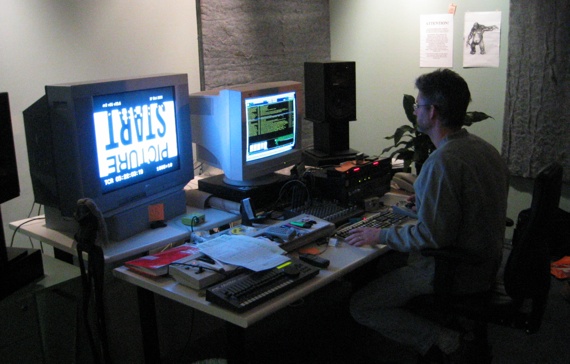
Awesome stuff! Can’t wait to read more!
great interview! can’t wait to hear more from David!
That flamethrower picture KICKS ASS.
Very interesting interview! I totally see eye to eye with your view on sound design. By the way, since I saw you comments on Waves Lo-Air, I’ve been hooked on it! It’s a great plug-in. I am curious though, how often, if at all, do you dabble with synthesis and making sounds strictly from that? I almost always prefer the actual sound of a real recording and its easier and more fun to bend reality with sound, rather than forging sound from nothing. But synthesis always has its benefits. I was just curious where you stand with that. Thanks!
Excellent stuff David!
Thanks so much for sharing David. This is great!
The more I read about other sound designers, the more I feel we’re all in this industry because of Burtt and Rydstrom’s work… They definitely got us ;-) I’m very excited to read you more David!
cool interview, looking forward to this months articles
Its interesting that you paid for your own animal recording sessions used for LOTR, though I can totally understand the desire to keep ownership of your recordings.
Man…I just get giddy reading this stuff! Thanks for sharing.
Its funny how Farmer states his influences and how he tried to replicate his peers and idols, as I find myself comparing my work to his. His work is excellent. I really enjoyed his work on the new ‘Nightmare on Elm Street’ and bought that movie purely for the fact the Farmer worked on it.